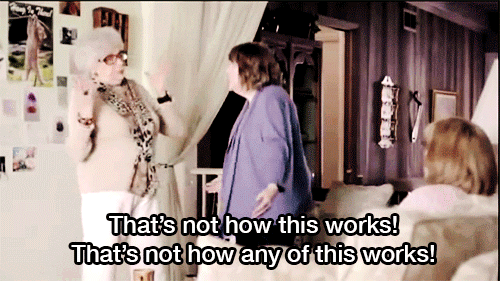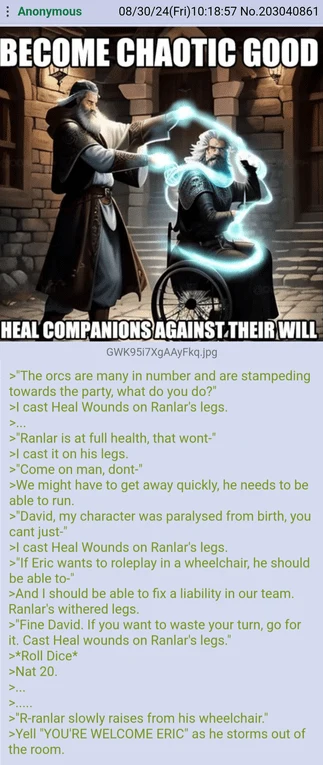I'm amazed he managed to roll a nat 20 on a d8, thats cheating on a whole new level
Greentext
This is a place to share greentexts and witness the confounding life of Anon. If you're new to the Greentext community, think of it as a sort of zoo with Anon as the main attraction.
Be warned:
- Anon is often crazy.
- Anon is often depressed.
- Anon frequently shares thoughts that are immature, offensive, or incomprehensible.
If you find yourself getting angry (or god forbid, agreeing) with something Anon has said, you might be doing it wrong.
I fuckin hate this notion in modern dnd (which is a misconception in the first place) that its just "let a d20 decide: the game". That's not how the game has ever been played. If you wanna have goofy mad-lib games with your friends where you just roll dice and laugh that's fine but you've never, in 50 years, had to roll to see if you're able to cast Cure Wounds or Heal.
That is a mechanic in some other games where spellcasting isn't a guaranteed thing. But not in core Dungeons and Dragons.
I wish my DM would accept this. I was born with this power but I might fail to cast it? Why am I not rolling to see if I walk properly since that was a learned ability.
Why am I not rolling to see if I walk properly since that was a learned ability.
Octodad: Pen&Paper edition?
QWOP tabletop edition
That is a mechanic in some other games where spellcasting isn't a guaranteed thing. But not in core Dungeons and Dragons.
Like in warhammer fantasy, where a guy i've played with managed to cast one spell during a fight that took 30-60 mins irl

Alright, you cast heal wounds. Any wounds on the legs are healed. You are now aware that paralysis from birth is not a "wound"
Yeah that's more regenerate or maybe power word heals territory.
Even with regenerate, what exactly are you regenerating? If the necessary neural pathways for the legs to work never developed in the first place, they couldn't be "regenerated". If this was your goal I think you might need to true polymorph a guy into "the same guy but his legs work"
It's explicitly within the capabilities of a Lesser Restoration, but also I would not allow a player to cast that spell on another player if that other player didn't want it
Edit: also as another person said, the adult who has never used their legs before never learned how to walk, so even if they had functioning legs, it would not help
ITT- Nerds take a 4chan green text way too seriously.
The problem is that newbies see this shit and think it's normal. One in every 20 rolls is a nat 20. It just means that what you tried went as well as it possibly could have. It doesn't make possible anything that wasn't already
I think a lot of us get that, we're just enjoying the joke.
Their group should be setting realistic expectations for newcomers then and if they wanna do a throwaway fun session with relaxed rules they can another time.
And if people that don't partake think a session is this wacky wild shit, who cares? They aren't playing.
Bad DM.
Nat 20 doesn't just let you do whatever. Cure wounds could easily be interpreted as returning the body to its natural state as the soul percieves it. If wanted his legs back more than anything so much that his soul held onto it like phantom pain, then I would say maybe a Greater Restoration could if he wanted that.
But if he'd grown accoustomed to his new life and his new legs and no longer sought to "restore" anything, having made peace with his injury, then no, greater restoration would just restore him to his own healthy self image. And a spell like cure wounds would do absolute dick.
I'd love to let this play out, narrate the lack of effect of this spell, and kick this asshole from the table.
So does that not imply that...
HP Restoratives are gender affirming care?
My read of simple HP restoring magical healing, at least in D&D, is simply that it is equivalent to accelerated natural healing with no potential for complications. So if whatever ailment you're trying to heal wouldn't also be healed by any arbitrary amount of rest and recuperation then Cure Wounds won't cut it either.
There's a book I read that takes place in Faerun where a cleric is getting tortured by ogre clerics by having his limbs broken and then they use heal spells to heal his limbs at odd angles. After he's freed, they break his limbs again, heal them in braces, but he had a permanent limp
DnD healing can only do so much before its just some high power reality changing magic.
narrate the lack of effect of this spell, and kick this asshole from the table.
You had me in the first half. First 95%
I refused the heal because I heard it causes autism.
Yes, Int is my dump stat, why do you ask?
… Ranlar slowly rises from his wheelchair before collapsing under his own weight as his atrophied legs give out. Your party must now find a way to move him away from the orcs without using his newly healed legs, perhaps on a nearby chair with wheels.
I cast heal on Ranlar's legs
I cast heal on my muscles to make them stronger than they were before, since I guess that's how it works now?
A 20 does not mean the spell achieves something out of its capabilities, what is this five year olds playing DnD?
Honestly, as a DM, when this doesn’t infringe on other player’s fun like here I don’t mind doing extraordinary stuff for the Nat 20
I once ran a campaign based on Fred Saberhagen's books of swords. I'm the books there are twelve swords that would be considered greater artifacts. One of my players was playing a pacifist. He picked up the sword called Townsaver while his village was being invaded. Anyone who has read the books knows this same situation happens right at the beginning of the series. The sword takes over, because it's power is to force anyone who holds it to protect unarmed innocents. He proceeded to slaughter the invading force. He was devastated.
This is like an episode of House.
House: "I roll for perception"
Wilson: "You rolled a 1"
House: "It's Lupus"
Player: "I do something to Eric's character against his will."
A good DM: "No, you don't."
End of discussion.
Eric just needed a better backstory for his wheelchair-bound character. And really in most high fantasy settings the only way it makes sense to have a permanent disability like that would be from a curse.
This thread has helped my understanding why new players I meet to are so intimidated by the game. It seems many people favor strict rule following over just having a good time.
This is the kind of petty squabbling that makes dnd for me 🤌
"The social model of disability states-"
"PELOR SAYS RUN, BITCH, THERE'S A MONSTERS"
Everyone's correctly pointing out how healing doesn't with that way, how about changing someone's body against their will being totally evil and not good?
It would depend on the god. A god of strength or perfection would see anything that makes you stronger as a good thing.
I have a character idea for a cleric that idolizes the god of pain.
They focus almost entirely on healing because you can't keep suffering if you're dead, if you're alive you can grow stronger, and therefore, in their own twisted mind, if you're suffering you're growing stronger.
They don't heal people right away unless not doing so would cause them to die and end their suffering. Instead, if the battle is over, they pull out a chart and start asking about how painful the wound is. This can be excruciating for the one who has to sit there and answer questions until they get healed.
The other portion of their build would focus on fighting the undead because they are abominations who cannot feel pain and cannot grow stronger because of it
The god goes along with it because their normal clerics may be into torture, which is great for pain, but they tend to get hunted down because of their extreme methods. This cleric causes pain indirectly by being surrounded by a bunch of murderhobos.
That spell doesn't require a d20. ᕕ( ᐛ )ᕗ
Going beyond the spell usecase might call for a d20 tho
